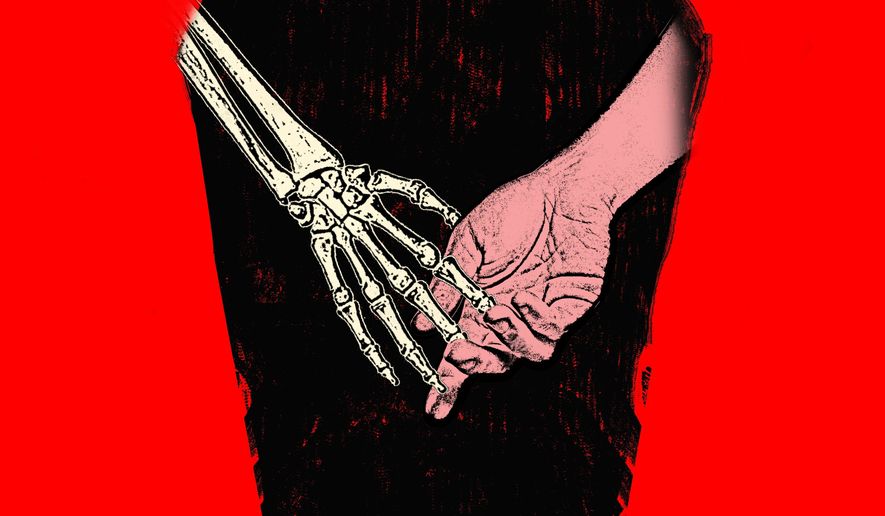OPINION:
In the last month, two older couples took matters into their own hands.
A 76-year-old woman shot her 77-year-old husband in the head at a Daytona Beach, Florida, hospital.
“Apparently, because he was terminally ill, they had a conversation about it, and they actually planned this approximately about three weeks ago, if he continued to take a turn for the worse,” Daytona Beach Police Chief Jakari Young told a news conference. “He wanted her to end this.”
In the pact, he was to kill her then himself, but he proved too weak to do so. After she killed him, she couldn’t take her own life and was eventually arrested. She could be charged with first-degree murder.
More than 5,000 miles away, David Harrison Robinson, 83, and Lucretia Robinson, 80, left their home in the Greek village of Methoni on Jan. 23 and haven’t been seen since. Their daughter, Julianna Robinson, wrote in a Feb. 5 Facebook post that her parents were “presumed dead of their own volition.”
Getting old is tough. Many people worry that they’ll have no control at the end.
I’ve had too much experience with this. My grandmother had Alzheimer’s for the last 15 years of her life, living into her 90s. My grandfather, too, lived into his 90s, but the last decade of his life was horrible. And my mother suffered from Lewy body dementia — the disease that reportedly prompted the comedian Robin Williams to take his own life at 63.
My mom’s last years were dreadful. She had horrifying hallucinations, heard voices, didn’t recognize her husband or children, and soiled herself frequently. It got so bad I thought about asking one of her doctors to simply give her an overdose of pain medication to end it all.
I never did, but I’ve wondered since then why we euthanize our pets — giving them a humane death to prevent further suffering — but we won’t do the same for people.
In several countries, including Canada and Switzerland, assisted suicide is legal. In the U.S., 10 states have a euthanasia policy, and seven others are weighing whether to pass their own doctor-assisted suicide laws — known as Medical Aid-in-Dying (MAiD) — in the coming months.
The law in Canada has led to terrifying results. Last year, more than 10,000 Canadians ended their lives via euthanasia, an increase of a third over the previous year, the Daily Mail reported. Canada has a liberal guideline on who can legally end their life, allowing people to die exclusively for mental health reasons — or even for hearing loss.
In the latter case, Alan Nichols, a 61-year-old British Columbian with a history of depression, was hospitalized in 2019 over fears he might be suicidal, the Daily Mail reported. He asked his brother to “bust him out,” but still in the hospital a month later, he submitted a request to be euthanized, listing hearing loss as his reason.
“Alan was basically put to death,” his brother said.
The U.S. has far more stringent rules. Nearly every state that has MAiD allows terminally ill adults with less than six months to live to ask doctors for a lethal dose of drugs that they can then ingest themselves, typically at home.
But doctors don’t really know just how long someone has to live. For example, Alice Bozeman was told in 2009 that she had terminal lung disease and would die within six months, hinting that she may want to make use of Washington state’s recently passed physician-assisted suicide law.
Ms. Bozeman lived for nearly 12 more years and died at home in Colorado, aged 72, in February 2021.
“I’m just so thankful. We wouldn’t have had 11 years and 10 months more of my mom to see her grandkids get married and have kids,” her daughter, Anita Cameron, told the Mail.
“It’s frightening,” said Ms. Cameron, who now campaigns with the group Not Dead Yet. “We’re going to see more cases of people using assisted dying because they’re poor or disabled, and more pressure and coercion, as it’s all normalized into law.”
Not Dead Yet says it is a “national, grassroots disability rights group that opposes legalization of assisted suicide and euthanasia as deadly forms of discrimination against old, ill and disabled people. Not Dead Yet helps organize and articulate opposition to these practices based on secular social justice arguments. Not Dead Yet demands the equal protection of the law for the targets of so called ’mercy killing’ whose lives are seen as worthless.”
It’s a dicey topic. We spare our pets from pain and misery that comes at the end of life, but not people? That seems wrong.
On the other hand, government can hardly do anything right. Remember the fiasco that was President Barack Obama’s Cash for Clunkers program? Do we really want to give the government control of life and death?
• Joseph Curl covered the White House and politics for a decade for The Washington Times. He can be reached at josephcurl@gmail.com and on Twitter @josephcurl.




Please read our comment policy before commenting.